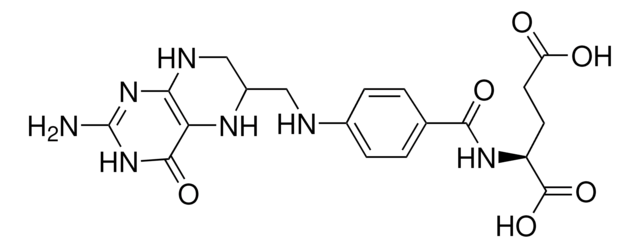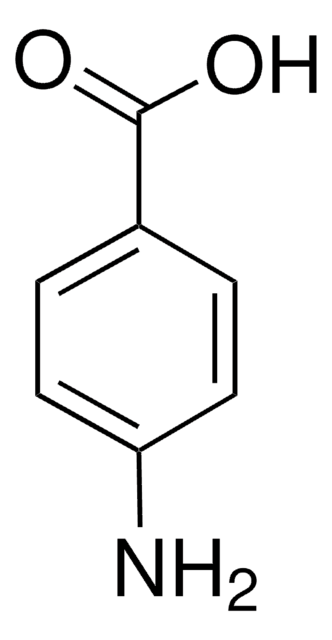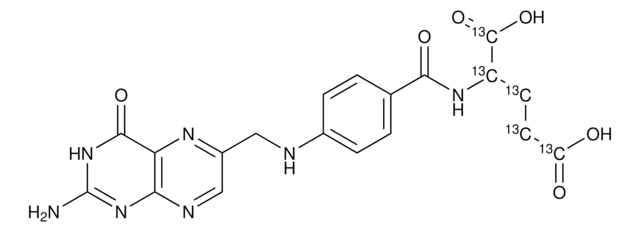F7876
Folic acid
≥97%
Synonym(s):
PteGlu, Pteroyl-L-glutamic acid, Vitamin M
About This Item
Recommended Products
biological source
synthetic (organic)
Quality Level
Assay
≥97%
form
powder
technique(s)
HPLC: suitable
color
faint orange to dark orange-yellow
faint yellow to dark yellow
mp
>285 °C
storage temp.
room temp
SMILES string
NC(N1)=NC(C2=C1N=CC(CNC3=CC=C(C(N[C@@H](CCC(O)=O)C(O)=O)=O)C=C3)=N2)=O
InChI
1S/C19H19N7O6/c20-19-25-15-14(17(30)26-19)23-11(8-22-15)7-21-10-3-1-9(2-4-10)16(29)24-12(18(31)32)5-6-13(27)28/h1-4,8,12,21H,5-7H2,(H,24,29)(H,27,28)(H,31,32)(H3,20,22,25,26,30)/t12-/m0/s1
InChI key
OVBPIULPVIDEAO-LBPRGKRZSA-N
Looking for similar products? Visit Product Comparison Guide
Related Categories
Application
- to induce acute kidney injury in mice
- as a supplement to cultivate MCF-7 breast cancer cells.
- to construct folate or TNF-related apoptosis-including ligand (TRAIL)-conjugated nanomicelles
Biochem/physiol Actions
Storage Class Code
11 - Combustible Solids
WGK
WGK 1
Flash Point(F)
Not applicable
Flash Point(C)
Not applicable
Personal Protective Equipment
Regulatory Listings
Regulatory Listings are mainly provided for chemical products. Only limited information can be provided here for non-chemical products. No entry means none of the components are listed. It is the user’s obligation to ensure the safe and legal use of the product.
JAN Code
F7876-100G:
F7876-BULK:
F7876-5G:
F7876-1G:
F7876-25G:
F7876-1G-KC:
F7876-10G:
F7876-VAR:
Certificates of Analysis (COA)
Search for Certificates of Analysis (COA) by entering the products Lot/Batch Number. Lot and Batch Numbers can be found on a product’s label following the words ‘Lot’ or ‘Batch’.
Already Own This Product?
Find documentation for the products that you have recently purchased in the Document Library.
Customers Also Viewed
Articles
This article reviews some of our newest and most innovative technologies and their specific applications toward cancer research. It describes how complex the disease of cancer is, and how difficult it is to identify one topic that is completely unrelated to any other.
This issue of Biofiles reviews some of our newest and most innovative technologies and their specific applications toward cancer research. In preparing this issue of Biofiles, one is reminded how complex the disease of cancer is, and how difficult it is to identify one topic that is completely unrelated to any other.
Our team of scientists has experience in all areas of research including Life Science, Material Science, Chemical Synthesis, Chromatography, Analytical and many others.
Contact Technical Service








